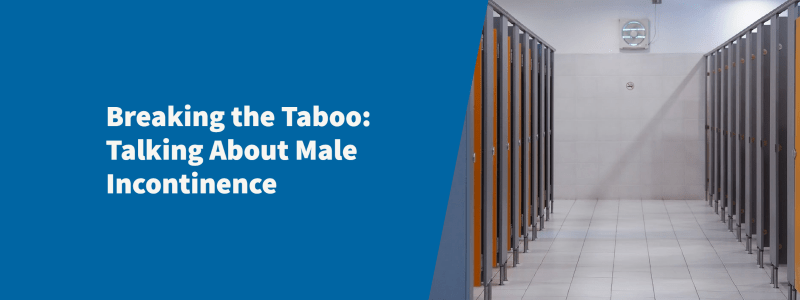Male incontinence is a topic that rarely gets talked about. It’s not something that is spoken about heartily in pubs or bars or at the football. But it’s a subject that is gaining more focus from PHS’s Dispose with Dignity campaign.
The campaign, in which PHS partner with Prostate Cancer UK, is to raise greater awareness for male incontinence and how the risks of this issue – in all men but in prostate cancer survivors – are more common than you may think.
In this piece, we will be focusing on the taboo subject, while offering further context to why it should not be taken lightly. But why should we be interested in incontinence and what does it mean for men?
What are the Facts About Male Incontinence?
The facts around male incontinence are stark and probably unknown to most. While it isn’t a topic raised very often, these are some of the things you should know:
- One in three men over 65 are estimated to have an incontinence problem
- One in 25 men over the age of 40 experience incontinence issues each yeah
- NHS estimate between 3-6 million suffer with some degree of urinary leakage
- 1 in 8 men will get prostate cancer, rising to 1 in 4 black men
- Following prostate treatment, 66% of men are worried about becoming incontinent
- 40% of men want more government legislation to ensure adequate facilities are provided for men
Where are Men Most Likely to Congregate?
These facts make for interesting reading, but understanding places where men congregate will inevitably help spread the word about incontinence, and help people break to taboo about the topic amongst men. But where are the most common places men congregate?
Sports Events
These are probably the lowest hanging fruit for getting messages across to men. While sports aren’t exclusively for men – or for them at all – sports are still participated in by blokes in the vast majority. A great place to break the taboo – albeit one that still struggles with various other taboos – would be stadiums, sports halls and other sporting venues. Having these become commonplace would eventually lend itself to softening people’s stances on this subject.
Workplaces
The vast majority of workplaces have a natural split of men and women. But that means that men, of all ages and experiences, are mixed together, especially when it comes to large businesses. Which means that workplaces are the ideal environments for changing minds. Almost all of us have workplace colleagues that we are friends with. During the water cooler conversations and breaks from work, we chat and discuss lives. Having this as a conversation point will no doubt educate people to the realities of male incontinence and prostate cancer.
Pubs and Bars
Drinking is a popular pastime, and in the U.K. pubs and bars are still used as the ideal meeting places for friends, colleagues and family.
Due to this popularity, including incontinence services in male washrooms would make more folks feel comfortable with coming into these venues and staying for long periods. What would help start conversations better than using our incontinence bins in nightlife venues.
How Taboo Subjects Impact Men
Taboo subjects massively impact men. It is no secret that men feel a heavy burden to ‘be a man’ about certain sensitive topics. According to research by PHS, 1 in 4 men feel depressed about their incontinence issues. In a topic that is rarely spoken about, this can be a heavy burden. There is a need to start changing people’s habits and attitudes about male incontinence and one way is through discussion and facilities.
Male Incontinence and Prostate Cancer
Another thing that is infrequently spoken about is how prostate treatment can cause incontinence problems. 1 in 8 men will get prostate cancer in their lifetimes. This is a daunting figure but rises to 1 in 4 black men. This is one of the biggest risks facing men’s health. But what is the link to incontinence?
Treatment for prostate cancer can leave men with incontinence problems because the treatment can often damage the nerves and muscles that control how you urinate. This leaves some men at clear risk of incontinence, meaning that while it’s a taboo subject, some men will be living in fear and maybe even shame. Confusing may also set in.
Helping men in their professional and social lives outside of the home can leave these people living and feeling more comfortable. And that’s one of the reasons Direct365 and PHS are offering the incontinence bin service.
How to Help the Men in your Organisation
It’s a tough topic to raise because people feel differently about discussing and being open about their health. The advice we think is appropriate is to add processes that allow people to talk about any issues, and to help them feel more comfortable about the conversation. Of course, we’d advise taking our male incontinence bin service, but other things, such as an open-door policy to discuss sickness matters, and management being aware and understanding of sensitive subjects. There’s no easy way to help make people feel comfortable, other than creating a consistent culture.
Direct365 Can Help
Our caring and dedicated team are on hand to help you out. Our male incontinence service bins are backed by Prostate Cancer UK and as part of the PHS Group, we are at the forefront of the recent Helping Men Live Well campaign. For further details, fill out the form below.


